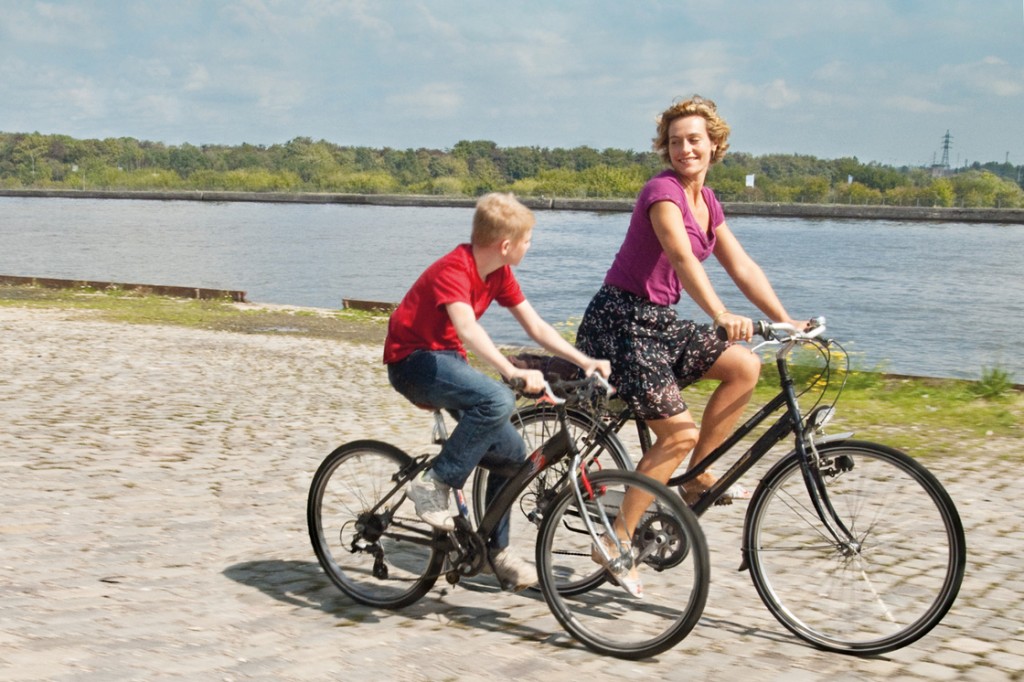
Filial duo Jean-Pierre and Luc Dardenne have forged a steady career regaling the struggles of the Belgian underclass. They are proponents of the plucky underdog, whether that be the desperate eponymous teenager striving for a better life in Rosetta (1999) or immigrant couple Sokol and Lorna in The Silence of Lorna (2008). Their stories are always small in scale and the hopes and dreams of humanity lie at the centre of their narratives. The sorry backdrop of industrial Wallonia often makes an appearance to emphasise the despair and degradation surrounding their players. The Kid with a Bike is no different, focussing as it does on 12-year old Cyril (Thomas Doret), a young boy abandoned by his father at a local care home and apparently all alone in the world.
Cyril is a headstrong, angry and troubled individual, clearly scarred by his abandonment. He’s in denial about his situation, frequently lashes out and refuses to believe that his father Guy (Jeremie Renier) would up and leave without so much as a word. This said, he’s also a determined and resourceful kid and soon runs away from school to track down his absent father and his beloved bike.
A chance run-in with local hairdresser Samantha (Cecile De France) provides Cyril with an unexpected chance of happiness as she recovers his bike and accepts his proposition to be her weekend foster carer. Desperate as he is for familial love and acceptance, it becomes difficult to empathise with Cyril due to his insular, melancholic demeanour and flagrant contempt for Samantha and her authority, despite her willingness to sacrifice everything for him.
Samantha’s selflessness ensures that together they soon track down Guy, who despite the idolatry that Cyril holds for him, is effectively a hands off, blasé and weak man unable to bear the burden of parental responsibility. Heartbroken and rejected, Cyril isolates himself, seeking solace in estate bad boy Wes (Egon Di Mateo) who shows Cyril some much needed attention, even though it’s clear his intentions are anything but admirable.
The Dardennes’ intimate and immersive direction places the audience at the very heart of Cyril’s personal travails, making it easy to get caught up in his youthful indiscretions. Their construction of character is perhaps less skilful, particularly in Cyril’s case. This is a boy who craves security and stability, but who, initially at least, utterly rejects the one person who can offer him just that, his head turned by Wes and a far more uncertain and murkier path.
Eventually, of course, Cyril realises that Samantha embodies the parent that he has craved all along, but by then he has already unleashed a degree of physical and emotional torment to those around him. As a result, when he does receive a dose of comeuppance it’s very difficult to sympathise.
This is a charming, disarming, albeit slight tale that despite its ability to envelop its audience in a relatively trivial story is hindered by its central character. De France provides solid support, with what little she has to play with, whilst Di Mateo’s thuggish Wes is a fairly one-dimensional and identikit.
The Kid with a Bike scooped the Grand Prix at last year’s Cannes, which suggests the Dardenne brothers are doing something right. One suspects it is their thematic exploration of the sense of purpose and potential, as well as their trademark grounded and raw aesthetic that continues to encourage accolades aplenty.
















{ 0 comments… add one now }